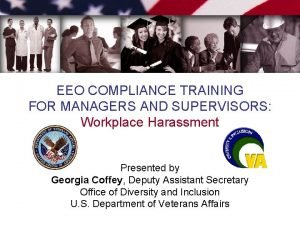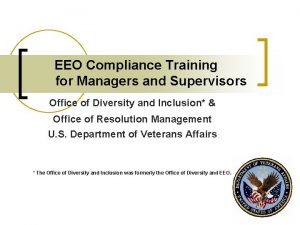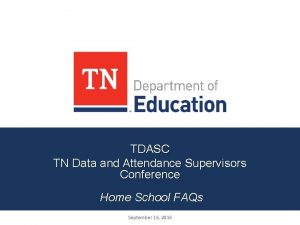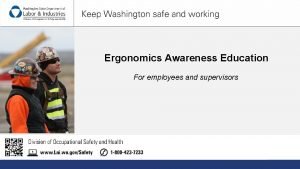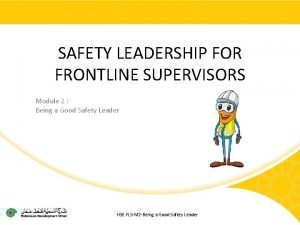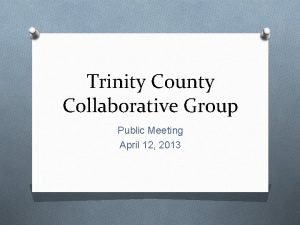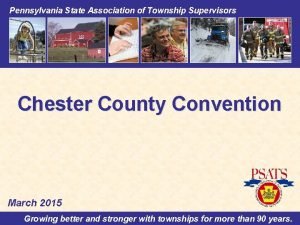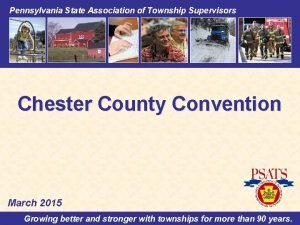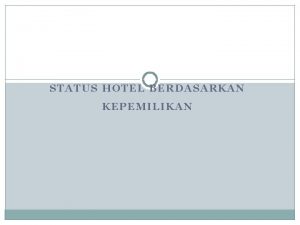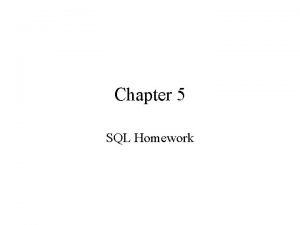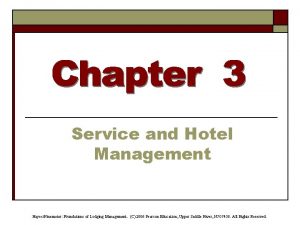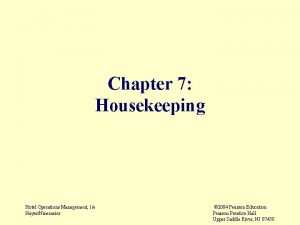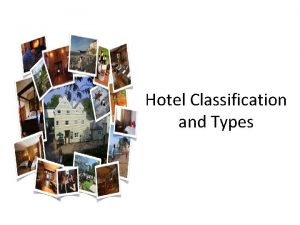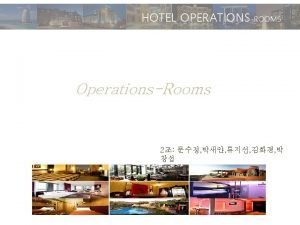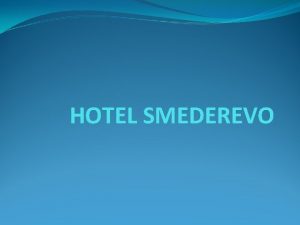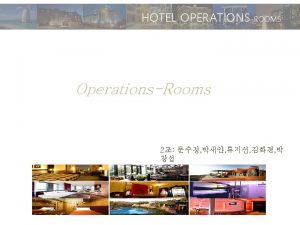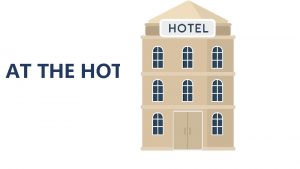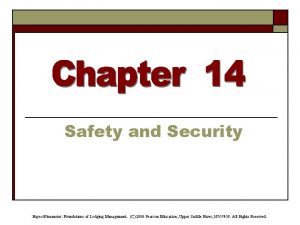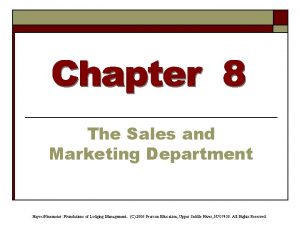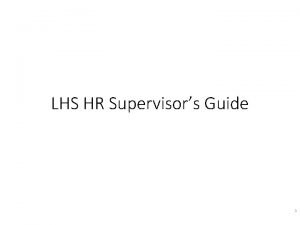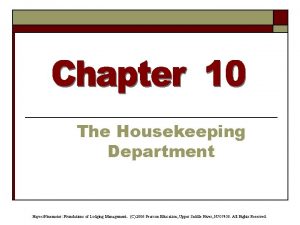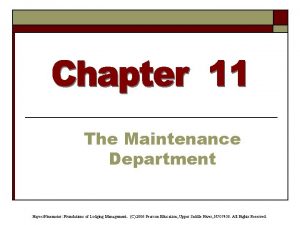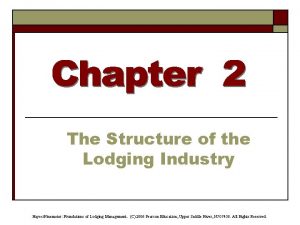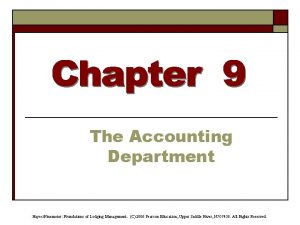The Hotel Team Supervisors and EntryLevel Staff HayesNinemeier


































- Slides: 34

The Hotel Team: Supervisors and Entry-Level Staff Hayes/Ninemeier: Foundations of Lodging Management. (C) 2006 Pearson Education, Upper Saddle River, NJ 07458. All Rights Reserved.

Importance of Teamwork Team: a group of individuals who work together while placing the goals of the group above their own. Hayes/Ninemeier: Foundations of Lodging Management. (C) 2006 Pearson Education, Upper Saddle River, NJ 07458. All Rights Reserved.

Importance of Teamwork In addition to formal work groups, informal groups may develop based upon: o o Common interests of group members The desire to be close to other employees in a similar situation Economic concerns A desire to satisfy personal needs that are common to others Hayes/Ninemeier: Foundations of Lodging Management. (C) 2006 Pearson Education, Upper Saddle River, NJ 07458. All Rights Reserved.

Importance of Teamwork Supervisors confronted with a group that works against the hotel’s goals must attempt to: n n n Modify the attitudes of group members Redirect the group toward more useful goals Confront factors that are causing the group members’ negative attitudes Participative Management: a leadership style that emphasizes the solicitation and use of employee input as managers make decisions. Hayes/Ninemeier: Foundations of Lodging Management. (C) 2006 Pearson Education, Upper Saddle River, NJ 07458. All Rights Reserved.

Importance of Teamwork Department teams can: o Share a common identity o Have common goals and objectives o Share leadership o Cooperate with each other o Provide input to creative decisions that affect the department Hayes/Ninemeier: Foundations of Lodging Management. (C) 2006 Pearson Education, Upper Saddle River, NJ 07458. All Rights Reserved.

Importance of Teamwork To be effective a team must: o Operate within a culture that supports teamwork o Be given some formal control traditionally reserved for top management o Be given the time required to undertake/complete assignments o Know about alternative ways decisions can be made o Be well aware of their responsibilities Hayes/Ninemeier: Foundations of Lodging Management. (C) 2006 Pearson Education, Upper Saddle River, NJ 07458. All Rights Reserved.

Importance of Teamwork Hotel benefits: o Higher productivity o Increased quality and quantity of work outputs o Higher levels of employee morale o Reduced operating costs Hayes/Ninemeier: Foundations of Lodging Management. (C) 2006 Pearson Education, Upper Saddle River, NJ 07458. All Rights Reserved.

Importance of Teamwork Tactics necessary for teamwork to be effective: o Each member must know the importance of the work and be well-trained o Teams must know they are supported by upper management o Teams can be used in all areas of the lodging organization o Members must have all necessary information to understand a situation and make effective decisions Hayes/Ninemeier: Foundations of Lodging Management. (C) 2006 Pearson Education, Upper Saddle River, NJ 07458. All Rights Reserved.

Role of Supervisors Manager: a staff member who directs the work of supervisors. Supervisor: a staff member who directs the work of entry-level employees. Entry-level Employees: staff members working in positions that require little previous experience in or knowledge of job tasks and who do not direct the work of other staff members. Hayes/Ninemeier: Foundations of Lodging Management. (C) 2006 Pearson Education, Upper Saddle River, NJ 07458. All Rights Reserved.

Responsibilities o o o o To serve as a Linking Pin: the concept that the supervisor links upper levels of management with entry-level employees. Communication, then, flows down and up the organization through the supervisor. To promote hotel goals To provide proper reports and other information To comply with operating requirements To use the hotel’s resources wisely To show respect To work as a member of the team Hayes/Ninemeier: Foundations of Lodging Management. (C) 2006 Pearson Education, Upper Saddle River, NJ 07458. All Rights Reserved.

Responsibilities Human Relations: skills needed to understand effectively interact with other people including employees on the job. Hayes/Ninemeier: Foundations of Lodging Management. (C) 2006 Pearson Education, Upper Saddle River, NJ 07458. All Rights Reserved.

Leadership Styles Leadership: accomplishing goals by working with others while, at the same time, gaining their respect, loyalty, competence, and enthusiastic cooperation. To be an effective leader, a supervisor must: n Have the knowledge and skill to do some of the technical aspects of the work done by those whom they supervise n Be confident in their ability n Be concerned about those whom they supervise n Provide information to employees to help them participate in the decision-making process Hayes/Ninemeier: Foundations of Lodging Management. (C) 2006 Pearson Education, Upper Saddle River, NJ 07458. All Rights Reserved.

Leadership Styles To be an effective leader, a supervisor must: o o o o Do what they expect employees to do Consistently assure that each task done by each staff member is understood, appropriately supervised, and accomplished on time Train staff members to work as part of the hotel’s team Make appropriate and timely decisions Help employees to develop an attitude of responsibility for the work they do Seek responsibility (and take it) for their actions Be involved in an on-going professional development program Hayes/Ninemeier: Foundations of Lodging Management. (C) 2006 Pearson Education, Upper Saddle River, NJ 07458. All Rights Reserved.

Leadership Styles The four leadership styles: 1. 2. 3. 4. Autocratic Leadership Style: the leadership approach that emphasizes a “Do it my way” philosophy. Bureaucratic Leadership Style: the leadership approach that emphasizes a “Do it by the book” philosophy. Democratic Leadership Style: the leadership approach that emphasizes a “Let’s determine the best way to do it” philosophy. Laissez-Faire Leadership Style: the leadership approach that emphasizes a “Do it the way you want to do it” approach. Hayes/Ninemeier: Foundations of Lodging Management. (C) 2006 Pearson Education, Upper Saddle River, NJ 07458. All Rights Reserved.

Special Supervisory Concerns Some of the most important responsibilities: Communication o Motivation o Training o Effective Working Relationships o Performance Appraisal Systems o Employee Discipline o Hayes/Ninemeier: Foundations of Lodging Management. (C) 2006 Pearson Education, Upper Saddle River, NJ 07458. All Rights Reserved.

Communication: the transmission of understandable information from one person to another person by use of words, numbers, or other common symbols. Reasons that communication is often ineffective: n Use of unfamiliar words or symbols n Poor timing n Background disturbance n Personal considerations n Personal differences n Other communication factors Body Language: the concept that one communicates by the way that arms, hands, and/or legs are positioned during a conversation or presentation. Hayes/Ninemeier: Foundations of Lodging Management. (C) 2006 Pearson Education, Upper Saddle River, NJ 07458. All Rights Reserved.

Communication To listen effectively, supervisors must: o Concentrate on what is being said o Look directly at the speaker; don’t let your ideas about the speaker/subject influence what you hear o Ask questions o Take notes o Don’t assume you know what the speaker will tell you o Don’t interrupt Grapevine: informal channels of communication that are not formally developed to disseminate information throughout an organization but that are used for this purpose by employees. Hayes/Ninemeier: Foundations of Lodging Management. (C) 2006 Pearson Education, Upper Saddle River, NJ 07458. All Rights Reserved.

Motivation Attitude: the way a person feels about objects, persons or events. Motivation: an internal force that drives employees to do something to reach a goal. Morale: the combination of all feelings that an employee has about all aspects of the job. www. motivation-tools. com Hayes/Ninemeier: Foundations of Lodging Management. (C) 2006 Pearson Education, Upper Saddle River, NJ 07458. All Rights Reserved.

Motivation 5 basic human needs: o Physical needs o Safety and security needs o Social needs o Ego (self-esteem) o Self-fulfillment 2 sets of factors to promote employee motivation: o Maintenance factors o Motivation factors Hayes/Ninemeier: Foundations of Lodging Management. (C) 2006 Pearson Education, Upper Saddle River, NJ 07458. All Rights Reserved.

Training can positively influence: o o o Productivity Quality Guests’ perception about the hotel Attainment of financial goals Improved job skills Level of employee selfawareness o o o Employee job satisfaction Help with employee recruitment efforts Improvement in employees’ attitudes Reduction in turnover Improved teamwork Hayes/Ninemeier: Foundations of Lodging Management. (C) 2006 Pearson Education, Upper Saddle River, NJ 07458. All Rights Reserved.

Individualized Training Advantages to individualized training programs: o Training can focus on specific needs o The trainee can receive specific and immediate feedback about performance o Training can progress at the speed most beneficial to the trainee o The trainer can develop a more personalized working relationship with the trainee Hayes/Ninemeier: Foundations of Lodging Management. (C) 2006 Pearson Education, Upper Saddle River, NJ 07458. All Rights Reserved.

Individualized Training Four-step training process: 1. 2. 3. 4. Preparation Presentation Practice Follow-up Hayes/Ninemeier: Foundations of Lodging Management. (C) 2006 Pearson Education, Upper Saddle River, NJ 07458. All Rights Reserved.

Individualized Training 1. Preparation Job task: an activity that an employee working in a specific position must know how to and be able to do. For example, a front desk clerk in a limited-service hotel must be able to properly check-in a guest. Hayes/Ninemeier: Foundations of Lodging Management. (C) 2006 Pearson Education, Upper Saddle River, NJ 07458. All Rights Reserved.

Individualized Training 2. Presentation The trainer explains and demonstrates the job tasks. 3. Practice The trainer performs the task alone while the trainer observes and makes suggestions. Hayes/Ninemeier: Foundations of Lodging Management. (C) 2006 Pearson Education, Upper Saddle River, NJ 07458. All Rights Reserved.

Individualized Training 4. Follow-up Reinforcement (Training): use of words and actions that emphasize the proper way to do a job task. Feedback (Training): the process by which a trainer informs a trainee about the extent to which a job task has been learned. Coaching: the process by which a supervisor provides ongoing training and feedback to employees to help them reach their highest level of performance. www. trainingmag. com Hayes/Ninemeier: Foundations of Lodging Management. (C) 2006 Pearson Education, Upper Saddle River, NJ 07458. All Rights Reserved.

Effective Working Relationships Four roles that trainers play: o Trainer o Mentor o Judge o Employee Representative Hayes/Ninemeier: Foundations of Lodging Management. (C) 2006 Pearson Education, Upper Saddle River, NJ 07458. All Rights Reserved.

Performance Appraisal Systems Performance Appraisal: a periodic formal evaluation of an employee’s job performance including a discussion of professional development goals; also called performance evaluation Hayes/Ninemeier: Foundations of Lodging Management. (C) 2006 Pearson Education, Upper Saddle River, NJ 07458. All Rights Reserved.

Performance Appraisal Systems Special concerns: o o o Some managers evaluate the employees themselves rather than their performance Some evaluators do not like to confront employees and/or to point out potential performance deficiencies Hotel managers and supervisors do not “automatically” know how to conduct performance appraisals Critical Incident: an activity (outcome) that results in unusual success or unusual failure in some aspect of a job. Hayes/Ninemeier: Foundations of Lodging Management. (C) 2006 Pearson Education, Upper Saddle River, NJ 07458. All Rights Reserved.

Employee Discipline: activities designed to encourage employees to follow established policies, rules and regulations. Discipline (Positive): reinforcement activities that encourage employees to continue to follow established policies, rules, and regulations. Discipline (Negative): punishment activities that encourage employees to follow established policies, rules and regulations. Hayes/Ninemeier: Foundations of Lodging Management. (C) 2006 Pearson Education, Upper Saddle River, NJ 07458. All Rights Reserved.

Employee Discipline Quality of hotel employee performance is influenced by: n n n Hotel-related factors Personal factors Other factors Peer Pressure: influence from persons in the same position or organizational level to do (or not to do) something. Hayes/Ninemeier: Foundations of Lodging Management. (C) 2006 Pearson Education, Upper Saddle River, NJ 07458. All Rights Reserved.

Employee Discipline Considerations when negative discipline is required: n n n Reprimands should be done in private Use only after positive discipline has proved ineffective Assure that information leading to the decision is available and accurate Hayes/Ninemeier: Foundations of Lodging Management. (C) 2006 Pearson Education, Upper Saddle River, NJ 07458. All Rights Reserved.

Employee Discipline How to become an employer-of-choice: 1. Be a leader 2. Prepare your staff members for their job Pre-Shift Training: training of employees in the same position that lasts only several minutes and is conducted at the beginning of a work shift. 3. Assure that the hotel is a professional place to work 4. Supervise consistently the way you would want to be supervised 5. Create a hospitable workplace 6. Celebrate successful employees www. employeeretentionsurvey. com Hayes/Ninemeier: Foundations of Lodging Management. (C) 2006 Pearson Education, Upper Saddle River, NJ 07458. All Rights Reserved.

Career Tracks To promote careers in the hotel/lodging industry supervisors can: Show excitement n Begin the emphasis on career rather than job at the time of recruitment n Continue the career emphasis during orientation n Provide the opportunity for all proficient employees to receive training and professional development if they so desire n Hayes/Ninemeier: Foundations of Lodging Management. (C) 2006 Pearson Education, Upper Saddle River, NJ 07458. All Rights Reserved.

Career Tracks To promote careers in the hotel/lodging industry supervisors can: n n Discuss learning opportunities during performance evaluations Serve as a mentor Serve as a role model Help interested employees plan a career ladder Career Ladder: a plan that projects successively more responsible positions within an organization or an industry. Hayes/Ninemeier: Foundations of Lodging Management. (C) 2006 Pearson Education, Upper Saddle River, NJ 07458. All Rights Reserved.
 Eeoc training for managers
Eeoc training for managers Compliance training for managers
Compliance training for managers Tennessee attendance supervisors conference
Tennessee attendance supervisors conference Ounces of ice cream in a large milkshake
Ounces of ice cream in a large milkshake Ergonomics awareness training for supervisors
Ergonomics awareness training for supervisors Ergonomics awareness training for supervisors
Ergonomics awareness training for supervisors Situational frontline leadership
Situational frontline leadership Danger zones for supervisors
Danger zones for supervisors Trinity county board of supervisors meeting
Trinity county board of supervisors meeting Bath county board of supervisors
Bath county board of supervisors Pa association of township supervisors
Pa association of township supervisors Pa state association of township supervisors
Pa state association of township supervisors Gp supervisors australia
Gp supervisors australia Hotel independen adalah
Hotel independen adalah Hotel.hotelno=room.hotelno(hotel room)
Hotel.hotelno=room.hotelno(hotel room) Hyper-themed hotel: fantasyland hotel, canada
Hyper-themed hotel: fantasyland hotel, canada Team spirit becomes team infatuation
Team spirit becomes team infatuation Team spirit becomes team infatuation
Team spirit becomes team infatuation The white team cheers for the blue team, just like
The white team cheers for the blue team, just like Hình ảnh bộ gõ cơ thể búng tay
Hình ảnh bộ gõ cơ thể búng tay Frameset trong html5
Frameset trong html5 Bổ thể
Bổ thể Tỉ lệ cơ thể trẻ em
Tỉ lệ cơ thể trẻ em Gấu đi như thế nào
Gấu đi như thế nào Chụp phim tư thế worms-breton
Chụp phim tư thế worms-breton Chúa yêu trần thế
Chúa yêu trần thế Các môn thể thao bắt đầu bằng tiếng đua
Các môn thể thao bắt đầu bằng tiếng đua Thế nào là hệ số cao nhất
Thế nào là hệ số cao nhất Các châu lục và đại dương trên thế giới
Các châu lục và đại dương trên thế giới Công thức tiính động năng
Công thức tiính động năng Trời xanh đây là của chúng ta thể thơ
Trời xanh đây là của chúng ta thể thơ Mật thư tọa độ 5x5
Mật thư tọa độ 5x5 Làm thế nào để 102-1=99
Làm thế nào để 102-1=99 độ dài liên kết
độ dài liên kết Các châu lục và đại dương trên thế giới
Các châu lục và đại dương trên thế giới
